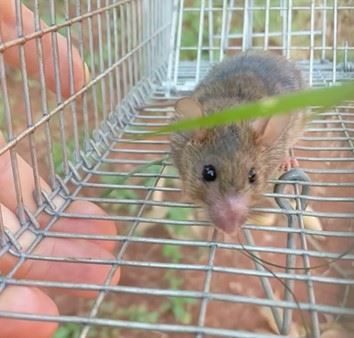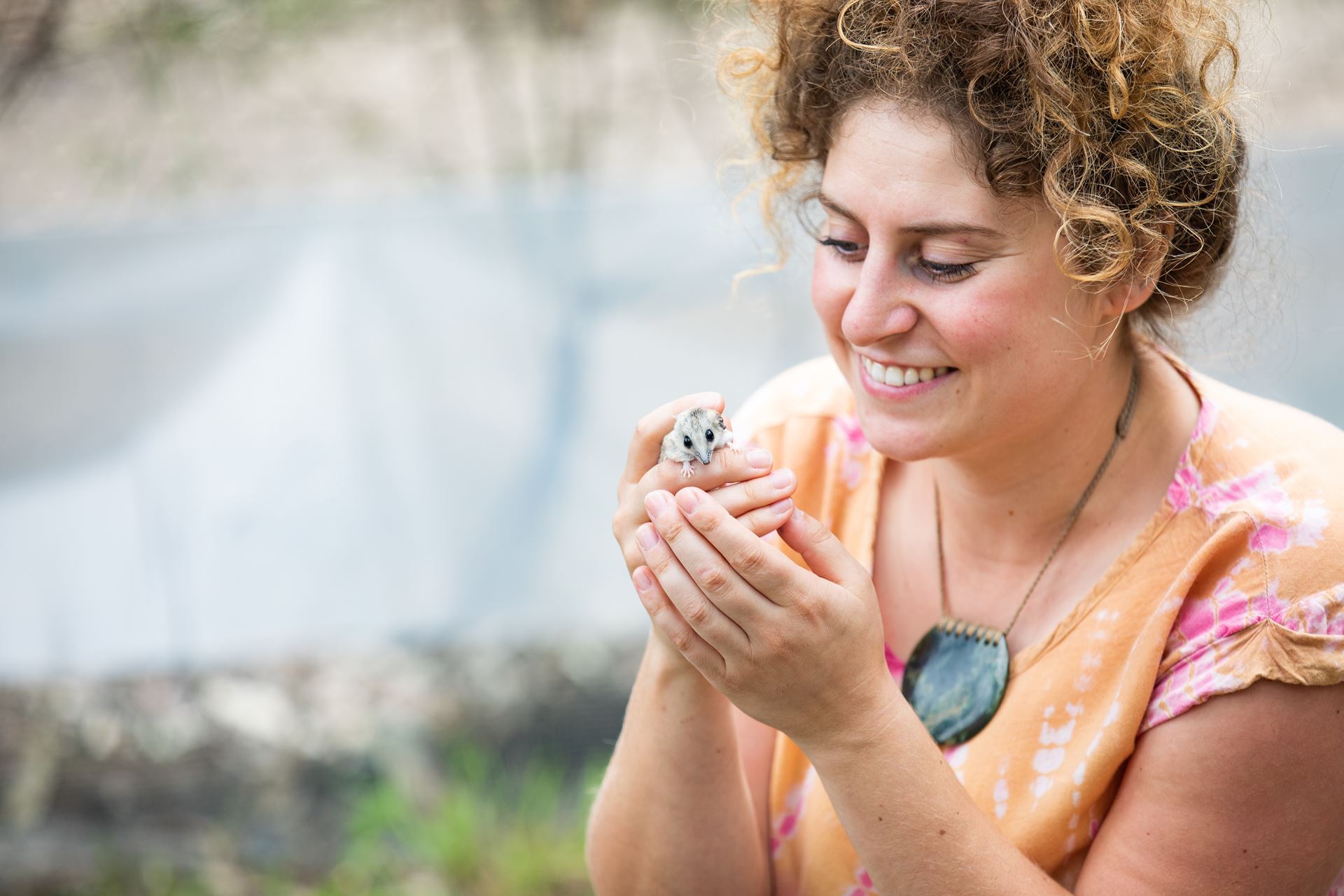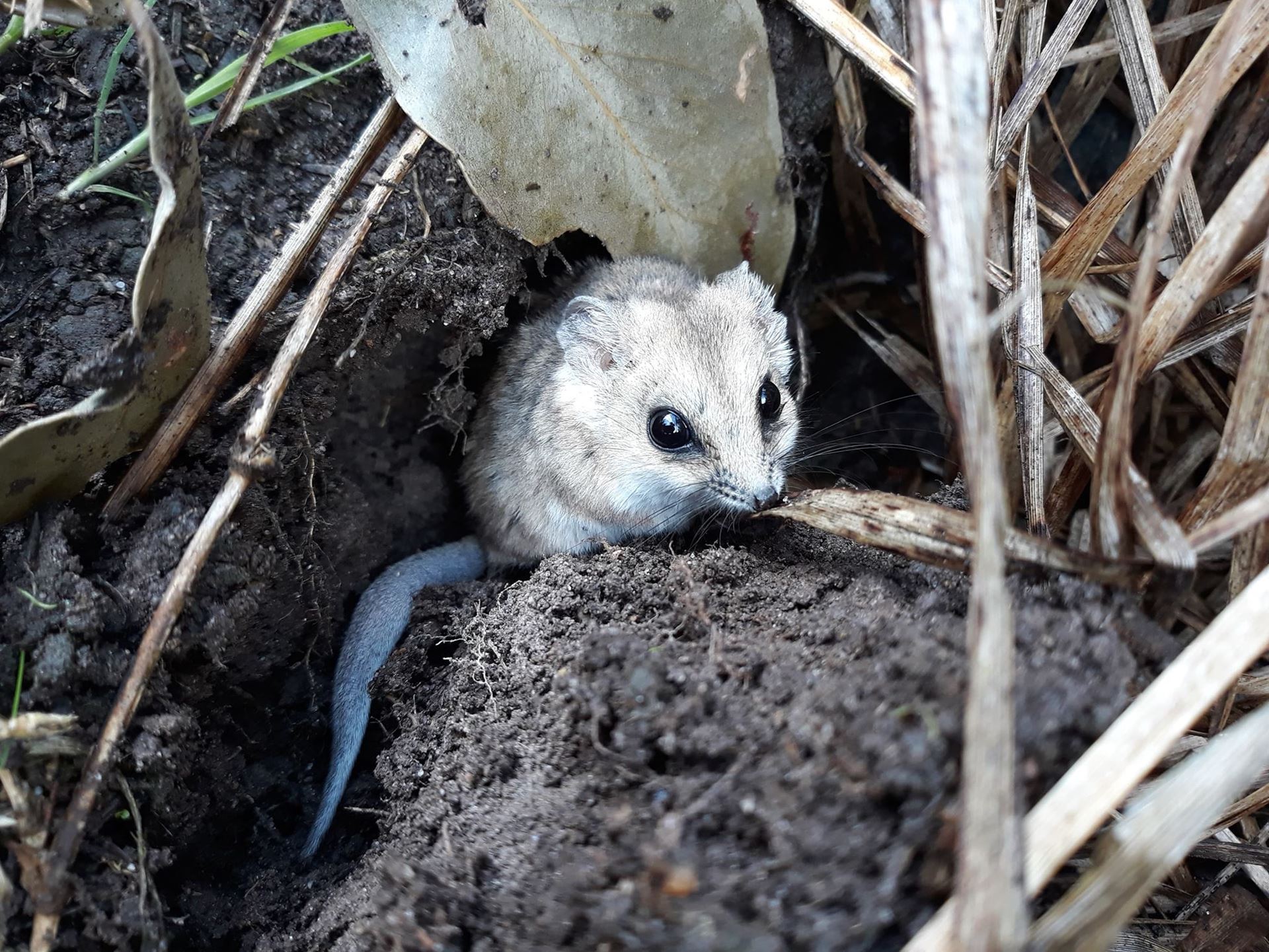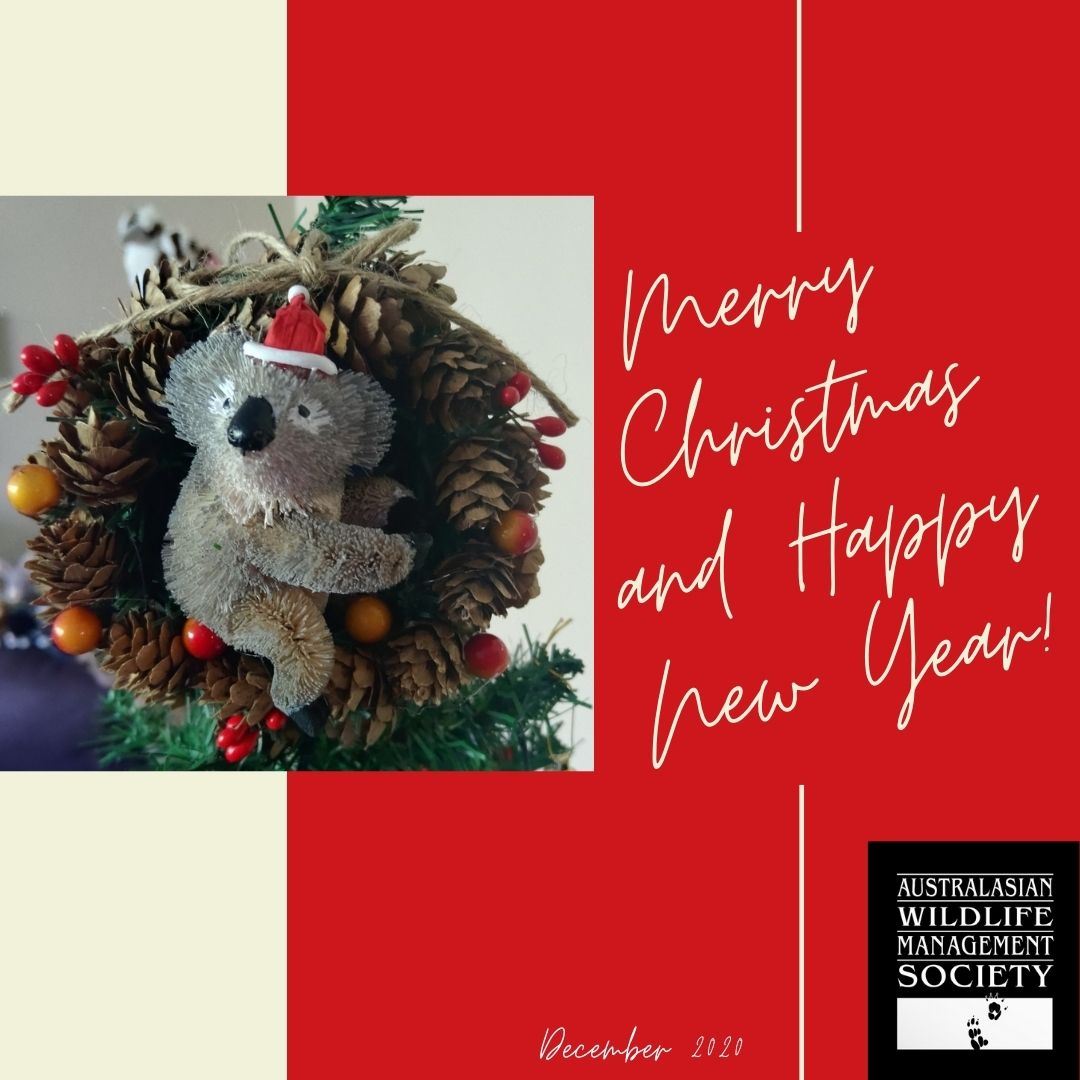 from the editor
from the editor
Yay, I made it! This is my second year as the AWMS newsletter editor. It just feels like yesterday when I was gathering all the information for our 2019 December Newsletter. I would like to think that this feeling is because I have kept myself busy throughout the year despite all the challenges that 2020 has brought. First, at the beginning of the year we had the fires and then in March-April with the pandemic we were in lockdown, forcing many of us to work from home and probably pushed us to explore different activities-hobbies. In my case I started a garden with orchids, kangaroo paws and carnivorous plants. And, just like that, December arrived and a few weeks ago we had our 33rd (1st virtual) conference. We have received many comments from members and social media followers, letting us know that they enjoyed the live stream allowing them to attend a conference while working or being anywhere in the world. I would like to thank again Konnie Gebauer our conference liaison officer, all the session chairs, the AWMS team and all the attendees for making this conference a success.
In this issue you will find the reports from the 2018 and 2020 Postgraduate Award winners, Kyla and Emily. You will also find the 2019 AGM minutes and don’t forget to check the jobs board section with the latest PhD opportunities and next year’s conference venue.
For any feedback and/or contributions to the website, newsletter and/or social media send me an email newsletter@awms.org.au, I am sure there are lots of interesting and exciting stories out there.
Don’t forget to follow us on social media and share or tag us. Thanks to you we have now 3,000 followers on Facebook
Facebook - Australasian Wildlife Management Society
Twitter - @AWMSociety
Instagram - @awmsociety
Linkedin - Australasian Wildlife Management Society
I hope you enjoy the last issue of 2020. Looking forward to hearing from you next year!
Happy holidays and all the best for 2021
Margarita Medina

agm 2019 minutes
On Wednesday December 09 2020 at 4:30 pm, the 2020 General Meeting was held during the virtual Conference. You can find the AGM 2019 minutes here
Website content Updates
Check out the latest new content on the AWMS website
Jobs Board
Currently with four PhD opportunities advertised. If you are a member and currently looking for a job, you can advertise your CV here. Or if you have a job or postgraduate position that you would like to advertise, get in touch with us.
https://awms.org.au/Jobs-Board
Member Benefits
Become a member of AMWS, check out the latest member benefits. More coming soon!
https://awms.org.au/Membership

2018 Postgraduate Student Award Final Report
Kyla Johnstone
University of Sydney
Problematic personalities and ecologically based pest rodent management in South Africa
In 2018 I was honoured to be the recipient of the Joan Southgate award. This award funded my travel to and research in South Africa, where, as part of my PhD I explored and ecologically based pest rodent control strategy, into which I incorporated the focus of my PhD, animal personality (consistent among-individual differences in behaviour, often relating to risk-taking). In South Africa, rodents cause significant damage to agricultural crops, particularly for small scale farmers. Following rodent population outbreaks, damage to crops can cause wide-spread food shortages and even complete crop loss. Unfortunately, current control practices rely predominantly on poison baiting; an ineffective method that results in secondary poisoning of native predators. I teamed up with local researchers at the University of Vena and with EcoRodMan, a UK funded initiative researching a suite of ecologically based pest rodent strategies across Southern Africa, to examine the potential for free-ranging domestic cats and dogs to create a landscape of fear with the goal of reducing rodent (Mastomys natalensis) crop damage in semi-rural small holdings without the need for poison. Although crop damage is often density dependent, even at low densities, just a few rodents can cause significant damage. Therefore, this project tested the effects of domestic predators on a) the greater rodent population, and b) the individual level, by exploring the relationship between individual rodent personality (docility) and foraging behaviour.
My preliminary results have demonstrated that rodent activity and abundance decrease as cat activity increases, but there was no discernible influence of dog activity. Rodent personality (relating to docility) also linked to cat activity and in areas of greater cat activity, rodents were less docile, suggesting cats may be selecting surviving rodents for certain personality traits. The remaining analysis will test if docility links to foraging behaviour to determine if risk-taking individuals are continuing to forage despite the predation risk, or if cats are effective in reducing density, abundance, and crop damage across a population of a pest rodent.
Promotion of cats as an effective rodent control strategy is a contentious issue. Feral cats can hybridise with the native African wildcat (Felis lybica) and predate on native birds and mammals. However, they may play an important, albeit temporary role in improving livelihoods until other strategies (e.g., restoring small native predators) can be trialled, promoted and implemented.
can hybridise with the native African wildcat (Felis lybica) and predate on native birds and mammals. However, they may play an important, albeit temporary role in improving livelihoods until other strategies (e.g., restoring small native predators) can be trialled, promoted and implemented.
We greatly appreciate the support of AWMS and the Joan Southgate awarded, without which this research and the opportunity to collaborate with our South African partners would not have been possible. The final behavioural analysis is currently being conducted and we look forward to sharing our results next year.

2020 Postgraduate Student Award Report
Emily Scicluna
La Trobe University
Using individual personality and cognitive assessment as a conservation tool for improving reintroduction/translocation success
Species extinction has reached crisis point globally and the need to develop effective and efficient ways of managing remaining endangered populations is greater than ever. Despite the brief time elapsed since European settlement, Australia holds the world record for highest number of species extinctions and is leading in the number of species listed as vulnerable and at risk of extinction. Captive breeding coupled with reintroduction has been identified as a key approach in conservation, however the success of such programs is debatable with survival after release often being low. The choice of candidates for release is often based on age, sex, and health status, however, there is growing recognition that an individual’s behavioural type is related to fitness and hence may be important to survival success. The study of behavioural traits has been used in wildlife to assess the suitability of individuals for captive environments, but less utilised for the selection of candidates for release. Currently, limited mammalian studies have determined behavioural/personality traits linked to survival success following release, and no studies have related cognitive testing to survival. Accordingly, my PhD research investigates the use of personality and cognitive assessment of individuals as a conservation tool for improving reintroduction success in a model species. Findings from my research will inform recovery teams on the release of individuals with traits linked to increased survival.
leading in the number of species listed as vulnerable and at risk of extinction. Captive breeding coupled with reintroduction has been identified as a key approach in conservation, however the success of such programs is debatable with survival after release often being low. The choice of candidates for release is often based on age, sex, and health status, however, there is growing recognition that an individual’s behavioural type is related to fitness and hence may be important to survival success. The study of behavioural traits has been used in wildlife to assess the suitability of individuals for captive environments, but less utilised for the selection of candidates for release. Currently, limited mammalian studies have determined behavioural/personality traits linked to survival success following release, and no studies have related cognitive testing to survival. Accordingly, my PhD research investigates the use of personality and cognitive assessment of individuals as a conservation tool for improving reintroduction success in a model species. Findings from my research will inform recovery teams on the release of individuals with traits linked to increased survival.
My study has two primary objectives: (1) assess behavioural & cognitive traits in wild and captive-bred fat-tailed dunnarts to identify any impacts of captive breeding on these traits and (2) identify behavioural & cognitive traits in captive-bred fat-tailed dunnarts linked to increased survival post reintroduction. The Australasian Wildlife Management Society Postgraduate Student Research Award
funding will be used to assist Aim 1 of my project.
METHODOLOGY
My PhD research is utilising Fat-tailed dunnarts (Sminthopsis crassicaudata) as a model species, which are members of the Dasyuridae (carnivorous marsupial) family. While fat- tailed dunnarts are not endangered they are an ideal model species for empirical experimentation, particularly for the other dasyurid species of that are the focal point of national population recovery programs, inclusive of the Kangaroo Island dunnart (Sminthopsis aitkeni), Tasmanian devil (Sarcophilus harrisii), Julia-creek dunnart (Sminthopsis douglasi), Sandhill dunnart (Sminthopsis psammophilia), Spotted quoll (Dasyurus maculatus) and Eastern quoll (Dasyurus viverrinus). Captive breeding has been identified as a major strategy in the conservation and management of many of these species and this research aims to inform recovery teams on the release of individuals with traits linked to increased survival. Using this model species allows us to captive breed and behaviourally test large numbers for experimental release, which cannot easily be done with an endangered species. The knowledge gained from this project will deliver significant outcomes for many Australian species at risk of extinction.
AIM 1 – Assess behavioural & cognitive traits in wild and captive bred fat-tailed dunnarts
to identify any impacts of captive breeding on these traits. Behavioural traits and cognition trials have been performed on 180 captive dunnarts, including: (1) shyness–boldness, (2) activity-exploration, (3) predator avoidance, (4) aggressiveness and (5) Y maze cognition trial to interpret memory. Following the trials individuals were then released to the La Trobe University 30ha invasive predator-free sanctuary, with analysis of survival currently underway.
RELEVANCE OF RESEARCH TO WILDLIFE MANAGEMENT
With improvements, captive management and release programs can provide a viable opportunity for rapidintervention and species recovery. It is of paramount importance that individuals selected for reintroduction post captive breeding have the best welfare outcomes and the greatest chance of being able to contribute to the success of the population. Resources within conservation initiatives arehistorically scarce, and there is a dire need to maximize survivability and reproductive success of individuals upon reintroduction, to properly accomplish conservation goals. The key aim of my PhD project is to provide an effective tool for the selection of individuals to best achieve threatened species reintroduction success. My research outcomes can then inform recovery teams on the release of individuals with traits linked to increased survival.
able to contribute to the success of the population. Resources within conservation initiatives arehistorically scarce, and there is a dire need to maximize survivability and reproductive success of individuals upon reintroduction, to properly accomplish conservation goals. The key aim of my PhD project is to provide an effective tool for the selection of individuals to best achieve threatened species reintroduction success. My research outcomes can then inform recovery teams on the release of individuals with traits linked to increased survival.
Reintroduction of a locally extinct species: The captive fat-tailed dunnarts have been released and therefore I have successfully reintroduced this near-threatened and locally extinct species back to its former home range at the introduced-predator free La Trobe Wildlife Sanctuary. The AWMS award will allow me to conduct the field work necessary to perform personality and cognition trials on wild individuals, providing valuable comparative insight to the data collected from captive individuals.
Conservation status update: In 2019, as part of this project I conducted one year of surveying at Western Treatment Plant (Werribee, VIC). This was ‘known’ to be one of the largest populations of this fat-tailed dunnarts in Victoria, however no traces of individuals, scats or nests of the species were located. I am now using this survey data in collaboration with the Department of Environment, Land, Water and Planning, in Victoria, to push for an increase in the conservation status of this species.
Funding from AWMS will allow me to conduct all the personality and cognitive tests I performed on captive individuals on wild fat-tailed dunnarts, to investigate possible impacts of captive breeding which impact reintroduction success. This will then complete Aim 1 of my research project.
I am incredibly grateful to have received this award and have the support of AWMS behind my research! Thank you AWMS!

2021 conference announcement and Call for volunteers
In 2021 AWMS will be held in Canberra, ACT. Further information will be provided in the upcoming months.
If you would like to help with the organisation of the AWMS2021 conference, please contact conference@awms.org.au. any ideas and suggestions for the conference program, symposia, field trips and workshops please get in touch with Konnie!
See you in Canberra! #AWMS2021
Happy Holidays!

Emily Scicluna - 2020 Postgraduate Award Winner